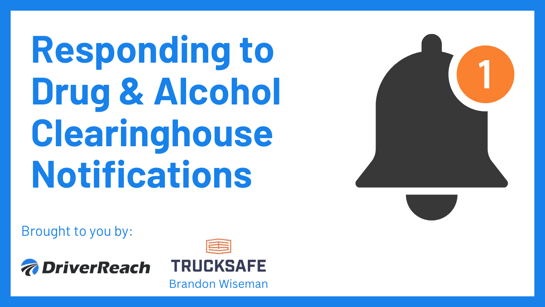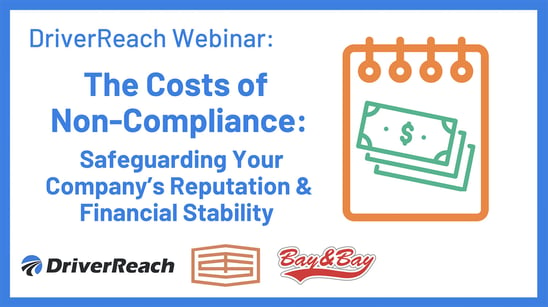💡The Drug & Alcohol Clearinghouse became fully implemented on January 6, 2023. Per the FMCSA, employers of CDL drivers will no longer need to include drug and alcohol requests in the scope of the safety performance history process of hiring a driver—the employer’s query of the Clearinghouse will satisfy that requirement. Other previous employment verification processes remain unchanged—check out VOE+ to make some of these processes easier on your team!
The information on this page is historical, educational material on this change as part of DriverReach industry content offerings. For more information on the FMCSA’s Drug and Alcohol Clearinghouse, please visit its FAQ page.
Did you have a chance to attend our recent webinar, "Is Your Fleet Prepared for Full Drug and Alcohol Clearinghouse Implementation?"? We received more questions than we had time to answer in the allotted time, so our guest presenter, Brandon Wiseman, President of Trucksafe Consulting, answered them below in this Q&A-style blog post.
General Questions
Making Sense of the Forms
Query Questions
Discovering Violations
Questions on Substance Abuse Professional (SAP) Programs
Questions about Third Party Administrators (TPA’s)/ Owner-operators
Handy Links
If you weren’t able to join the webinar live, don’t worry – you can watch it on-demand anytime!
General Clearinghouse Questions
Question: Is this for CDL only or DOT non-CDL drivers also?
Answer: Drug/alcohol testing applies only to drivers who operate vehicles or combinations that require a CDL.
Question: If the owner-operator is returning after 3 months, should we run pre-employment clearinghouse on him again?
Answer: The regulations don’t give a precise answer to this question. If the owner-operator has been gone for 3 months and was not left in your random testing pool during that time, I’d recommend requalifying the owner-operator and running a new query/pre-employment test.
Question: If you did not run an annual one at the beginning of this year, can you get in trouble? Or you can still do it even if it is almost the end of the month?
Answer: Limited queries can be run at any time. The key is to ensure that each limited query you run is dated within 12 months of the last one you ran. Otherwise, it would be considered a violation in the event of an audit.
Question: What happens if we hire a CDL driver for non-CDL driver role but 1x/month they drive CDL, do they fall under CDL guidelines always?
Answer: If you hire a CDL holder to operate a vehicle or combination that doesn’t require a CDL, then they are not subject to drug/alcohol testing, and you wouldn’t have to query the Clearinghouse. However, if that driver ever drives a vehicle or combination that requires a CDL for you–despite the relative infrequency–they would be subject to drug/alcohol testing, and you would need to utilize the Clearinghouse.
Question: So if we were to hire a driver that has completed 6 of the 12 required testing, we need to contact the previous employer to give us documentation stating that they have done so?
Answer: Yes, if a driver applicant is in the midst of required follow-up testing, the prospective employer of that driver must reach out to the previous employer to obtain that driver’s follow-up testing schedule and then comply with it on a go-forward basis.
Question: Are there any states that currently check the clearinghouse before issuing or renewing a CDL? I believe the 2024 date is a deadline for all states to be online with that process.
Answer: Correct. 2024 is the deadline by which all states must do so. Off the top of my head, I’m not aware of which states (if any) currently do so.
Question: Is there any talk about a federal registry for accidents?
Answer: Not that we’re aware.
Question: Will DriverReach change the application to reflect this change?
Answer: OF COURSE! Just waiting until Jan 6, 2023!
Making Sense of the Forms
Question: Will a new form be released that will not have drug & alcohol information on it?
Answer: There is no mandated form for this purpose; however, the FMCSA has a sample form on its website. That sample form still needs to be updated as of the date of this webinar.
Question: Is the Consumer Disclosure and Authorization Form appropriate to request the dates of employment and accident info when not listed on the DAC/PRE?
Answer: I’m not familiar with this form specifically, but the form will suffice if it asks the applicants’ previous employers to:
- verify employment; and
- provide details about DOT-recordable accidents over the past 3 years, as well as any information about non-DOT-recordable accidents they wish to provide
Question: Do you have a certain type of permission form for consent from a new hire to submit to the previous employer?
Answer: Yes, prospective employers must obtain consent from their applicants to reach out to previous employers and obtain the requested information. Here is a sample consent form from FMCSA.
Query Questions
Question: If you needed to look more into the query, where/what would you see?
Answer: When you run limited queries, the result will simply tell you whether drug/alcohol-related information about a particular driver exists in the system or not. If so, then the regulations require you to run a full query to see what that information is (i.e., a positive test result, refusal to test, etc.).
Question: Is it okay to rerun a full query instead of a limited query?
Answer: This is permissible; however, full queries require specific consent from each driver that must be given through their Clearinghouse account. Limited queries, on the other hand, can be run with more generic consent, given by the drivers outside of the Clearinghouse. Thus, it’s typically easier and quicker to run limited queries than full queries.
Question: Does that 30 days start when the query is pulled or when the driver accepts our request and the results return?
Answer: It runs from the date the result is returned to you.
Discovering Violations
Question: If a CDL holder has a positive test under a DOT modality other than FMCSA, like PHMSA, is that test information reported into the Clearinghouse?
Answer: No, violation data from other modal agencies is not included in the Clearinghouse. As a result, if you are hiring a driver who was previously subject to a different modal agency’s drug/alcohol testing rules, you still need to reach out manually to that driver’s previous employer to ask drug/alcohol-related questions.
Question: After January, do you recommend removing the section on employment verifications inquiring about D&A violations?
Answer: Absolutely - that's what we'll be doing with all faxes, emails, or other requests for previous employment. We'll query the Clearinghouse for drug test data.
Question: What about a driver that got a DUI, not in a CMV, that has been finalized in court?
Answer: DUIs in personal vehicles don’t necessarily end up in the Clearinghouse. However, that driver has likely lost their driving privileges as a result of the conviction, in which case, they would be prohibited from operating.
Question: Can you legally tell a driver that you are not going to hire them because of a positive test? I am new to this business and want to make sure I am doing it right.
Answer: Drivers who have violated the drug/alcohol testing rules are prohibited from performing safety-sensitive functions, including driving, unless and until they complete the return-to-duty process. So if you are hiring for a driving position and a candidate cannot legally drive, they are presumably not eligible for that position. Be sure to check with employment counsel on matters of employment law.
Question: Why doesn't seeing the personal vehicle DUI on a driver MVR count as actual knowledge that needs to be reported to the Clearinghouse?
Answer: FMCSA’s actual knowledge guidance (available here) and regulation (49 CFR 382.107) says that actual knowledge includes “a traffic citation for driving a CMV while under the influence of alcohol or controlled substances.” The guidance doesn’t include situations where a driver receives a DUI in a personal vehicle.
Question: Is the employer required to obtain the follow-up testing plan for an employee who has tested positive and been subsequently terminated?
Answer: Yes. A prospective employer of a driver who tested positive while working for a previous employer must obtain the follow-up testing plan from that driver’s previous employer and then ensure it is followed if the driver is hired.
Questions on Substance Abuse Professional (SAP) Programs
Question: Is there a timeframe for the drivers to start the SAP program? Should they start it immediately?
Answer: There’s no timeframe within which they must start the SAP program, but they are prohibited from performing any safety-sensitive functions unless and until they complete the return-to-duty process.
Question: Any idea how long it takes to get a driver through the entire process to get validated to drive again after testing positive for drugs?
Answer: It depends on the driver’s SAP and the treatment plan they establish.
Question: We operate a Truck Driving School. On every start date of a new class we conduct DOT Drug Screens on all students. If someone fails a drug screen, the lab reports this to the clearing house. Then, we advise them that they have to attend a Substance Abuse Program. My question is as a School can we enter a return to duty status after they complete the SAP program and provides a negative drug screen upon returning to school.
Answer: Yes. Truck Driving Schools have the same Clearinghouse obligations vis-a-vis their CDL students as employers/carriers. Before a school allows a student with a prior drug/alcohol testing violation to operate a CMV, it must first ensure the student has completed the SAP process and then administer a return-to-duty test (if it has not been previously administered by another employer). The school has an obligation to report the negative return-to-duty test result to the Clearinghouse, assuming it administered it.
Questions about Third Party Administrators (TPA’s)/ Owner-operators
Question: We use a third-party vendor for Verification of Employment. What will we have to do differently?
Answer: Your vendor will likely tailor the questions it’s asking of your applicants’ prior employers come January 2023, but it doesn’t hurt to check with them to make sure that’s the case. As of January 6, 2023, carriers no longer have an obligation to ask drug/alcohol-related questions of previous employers, except in limited circumstances.
Question: Can a third-party vendor have an account to get the information for their client, or does the employer have to run the query?
Answer: Employers can have TPAs run queries and make reports on their behalf. In these cases, the employer would designate a TPA for these purposes through its Clearinghouse account.
Question: Will third parties such as Driver IQ continue running the DOT drugs and alcohol after 6th January, or will they just give us accident information?
Answer: Best to check with the particular vendor to see how they intend to handle this.
Question: If you get employment dates and accident info from a third-party vendor, are you required to reach out directly?
Answer: No. As long as the record you obtain from the vendor contains all the required information and you keep copies of this information in the drivers’ qualification files, then you do not need to reach out directly.
Question: We are moving to a B2B model with our Owner Operators as a result of CA's AB5. Do we have any responsibility with regard to the Clearinghouse once this change goes into effect?
Answer: If the plan is for the owner-operators to become motor carriers in their own right, and for you to broker freight to them as a regulated property broker, then you do not have any Clearinghouse-related obligations vis-a-vis those motor carriers or their drivers. On the other hand, if the owner-operators continue to operate under your USDOT number, you would still be obliged to utilize the Clearinghouse.
Handy Links
Question: Where can you find the current fines for not registering with the Clearinghouse?
Answer: This article highlights the FMCSA’s recent revisions to the civil penalties for Clearinghouse violations.
Question: How do you sign up for the FMCA newsletter?
Answer: You can sign up here to receive the FMCA newsletter
Stay tuned for more upcoming webinars, as well as other important recruiting and retention related topics from DriverReach's blog.




